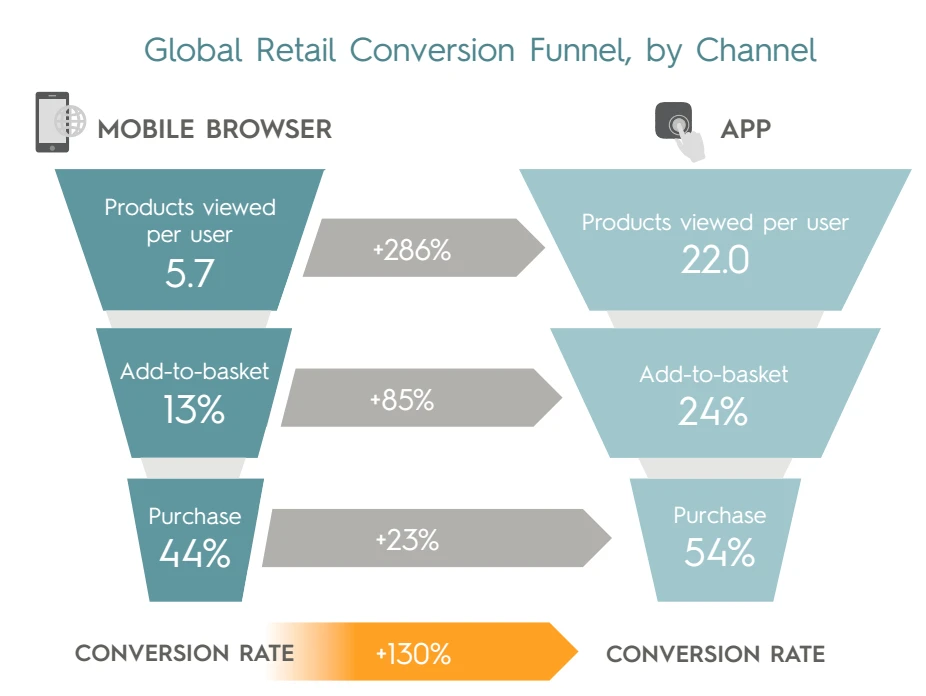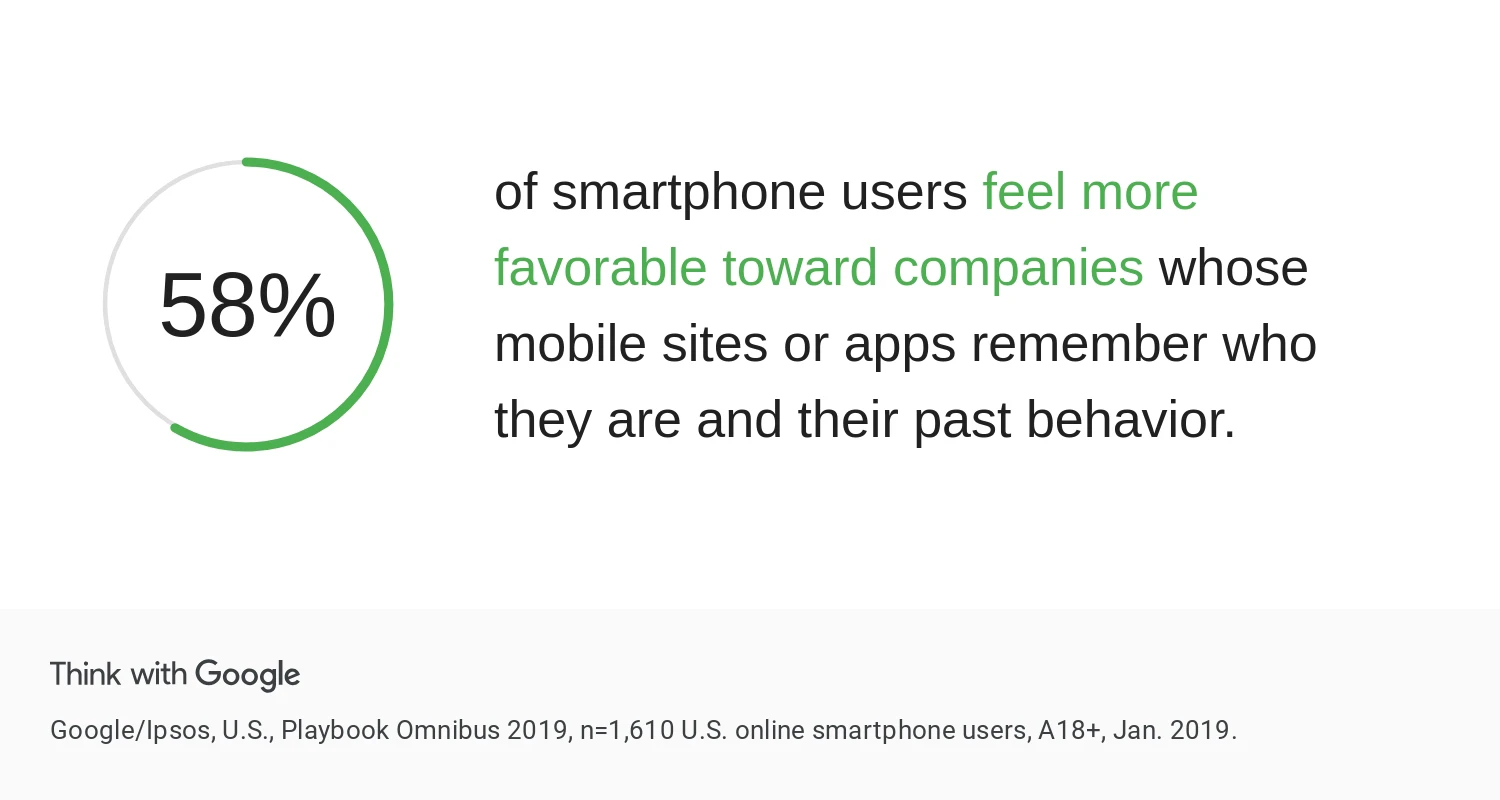4 Reasons why an app is a must for mobile businesses


Widespread use of personal devices with increased distribution of smartphones has heralded the exponential development of mobile businesses. Your potential users can always be online via mobile devices without constraints of time and space. They spend considerable time on using mobile apps everyday. Especially, the time spent on mobile apps increased with the breakout of the COVID-19 pandemic. According to App Annie, the time spent on mobile apps during the 2nd quarter of 2021 is still considerably higher than the figure of the 2nd quarter of 2019 before the COVID-19 pandemic hit.
The increase of mobile device use and time spent on the app led to the increase of potential users for mobile business companies and user data. The changing landscape of the mobile market abetted the need for businesses to optimize their websites for mobile and to have their own apps. The number of apps is increasing steadily for the same reason. However, the increasing number of apps led to fierce competition, and it became harder than ever to catch users on your app.
Why should mobile businesses build their own apps to succeed despite the keen competition?
Before getting to know why making an app is a great idea, it is necessary to understand the difference between the mobile web and the mobile app. Mobile businesses are mainly based on the two platforms - the web and the app - to boost the visibility of their products and to communicate with customers. Since two platforms play significant roles in the customer journey, it is pivotal to form a strategy for the two elements to be seamlessly combined.
The mobile web is a platform capable of acquiring potential customers through search engines and other means, enabling contact with the brand in the extensive online network. The web serves as an opportunity for acquiring varied and many customers since they can access the products with the mobile web without downloading apps. If the customer is satisfied with the experience of encountering a brand through the web, that encounter could serve as a starting point in which a random visitor becomes a real customer.
However, it must be noted that there are limitations for the mobile web in providing tailored customized experiences and customers are likely to have different user experiences depending on what browser they are using. Also, an unstable payment system on the mobile web may lead to user churn during the payment process. This will have negative consequences for retention and conversion rates.
The mobile app is capable of making up for the shortcomings of the mobile web. Customers can be provided a tailored experience since they are more likely to be continued to be signed in, making their interaction with the brand seamless. Notifications and individualized promotions also enable high-quality personalization. This will lead customers to stick to your products and put you in a better position for more active customer engagement. The mobile app will also resolve uncertainties of user experience from various mobile web browsers they are using.
Nowadays, more companies are choosing to create their own mobile apps, even though it is technically possible to have only a mobile web to run the business, since apps are capable of complementing the shortcomings of the web and provide certain benefits. Let’s dive into the four reasons why mobile businesses must have their own apps as follows.
One of the most decisive reasons for the need for mobile apps is that they have a higher conversion rate than the web. Retention, purchase conversion, and LTV can also be improved as well. While it’s no easy job to get customers to install an app, the value they can generate from the customer after installation is far greater. Apps not only enable fast and easy interactions with the customer but also enable customer engagement and provide a personalized user experience based on data.
Here are some research findings proving the high conversion rate of mobile apps.
First of all, according to Criteo’s research findings, mobile apps have a conversion rate 3-4 times higher than that of the mobile web in e-commerce and travel. More specifically, while the conversion rate for the mobile web was only 4% in e-commerce advertisements, the conversion rate for the app was 18%. Not only that, the conversion rate for the mobile web was 6% while the conversion rate for the app was 20%. The following image compares the conversion funnel of global retail companies by mobile web brower and app.

Also, 2019 Mobile Commerce Report: Holiday Analysis released by Button analyzed the data collected during 2018 holiday shopping season and shared the following insights on the growth of the mobile market.
Since mobile apps are optimized for mobile devices, they are fast, efficient, and can be accessed conveniently. Because mobile apps are placed as icons on the home screen, they are capable of boosting accessibility since users are able to easily access products without URLs and browsers.
Not only that, the accessibility to the device’s own features, such as cameras, GPS, biometric authentication (i.e. fingerprint recognition and facial recognition such as touch ID), and Bluetooth has been greatly enhanced, allowing improved seamless interactions with users. Since these functions can be provided more stably on mobile apps rather than mobile browsers, they are capable of improving the usability and convenience of products.
Such features can also have the following positive effects.
To enjoy these benefits, it is absolutely essential to understand how to provide an app experience for customers as well as continuous UI and UX improvements are required.
Privacy reinforcement including Apple’s new iOS 14.5 update and Google’s stopping support of third-party cookies is making it harder to collect third-party data. That is why the collection of first-party data based on logged in users has become more important than ever. Once users sign in on the app, users are able to enjoy improved convenience and usability while brands can analyze user activities based on data and guide users on the planned user journey with CRM marketing solutions such as Braze. First-party data also enables collection of more accurate user data compared to cookie-based data.
It is effective to analyze the collected data to identify where customers churn and how to improve the retention rate as well as analyzing by cohort analysis through analytic solutions such as Amplitude. Such data analysis could contribute to improvement of UI and UX of products and increased conversion and retention rates through added core functions. The key to product-led growth is the actual behavior data collected from users.
Furthermore, Mobile Attribution Softwares such as Airbridge can help to organize re-engagement marketing campaigns with users who install the app from ads.
Customer’s data is also valuable for providing personalized experience to customers. The customer information and data collected from each product enable more sophisticated and customized user experience as well as personalized marketing campaigns. According to the research results provided by Think with Google, 58% of smartphone users feel more favorable towards companies whose mobile sites or apps remember who they are and their past behavior. This puts into perspective how much personalized experience based on customer behavior is important.

Push notifications and in-app messages can be used to send out messages to customers at the right time and place. Sending in-app notifications is even free like an added bonus. CRM marketing solutions such as Braze is a considerable option if you would like to carry out more advanced in-app campaigns. According to Braze’s research findings (KO)there are research findings that customer engagement increased by 131% after communicating with users through in-app messages. Promotion through such means will lead to immediate user response and visible revenue growth as well.
To sum up, mobile business requires both mobile web and app. Despite the resources needed for app development and fierce competition, apps can effectively contribute to improving retention and conversion rates and profit growth. Apps also enable continuous and personalized communication with customers as well as providing first-party customer data to gain a foothold in mobile business through product growth and high-quality personalization.
The app is definitely one of the most important means for the success of mobile business.


